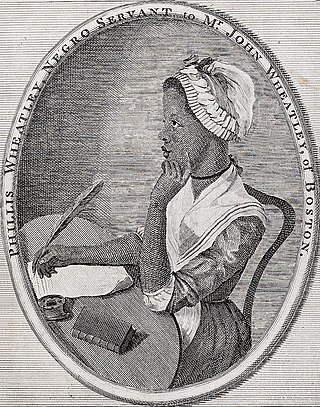
Phillis Wheatley Peters, also spelled Phyllis and Wheatly was an American author who is considered the first African-American author of a published book of poetry. Born in West Africa, she was kidnapped and subsequently sold into slavery at the age of seven or eight and transported to North America, where she was bought by the Wheatley family of Boston. After she learned to read and write, they encouraged her poetry when they saw her talent.
This article contains information about the literary events and publications of 1773.

John Singleton Copley was an Anglo-American painter, active in both colonial America and England. He was probably born in Boston, Province of Massachusetts Bay, to Richard and Mary Singleton Copley, both Anglo-Irish. After becoming well-established as a portrait painter of the wealthy in colonial New England, he moved to London in 1774, never returning to America. In London, he met considerable success as a portraitist for the next two decades, and also painted a number of large history paintings, which were innovative in their readiness to depict modern subjects and modern dress. His later years were less successful, and he died heavily in debt. He was father of John Copley, 1st Baron Lyndhurst.
Lucy Terry Prince, often credited as simply Lucy Terry (1733–1821), was an American settler and poet. Kidnapped in Africa and enslaved, she was taken to the British colony of Rhode Island. Her future husband purchased her freedom before their marriage in 1756. She composed a ballad poem, "Bars Fight", about a 1746 incident in which two white families were attacked by Native Americans. It was preserved orally until being published in 1855. It is considered the oldest known work of literature by an African American.
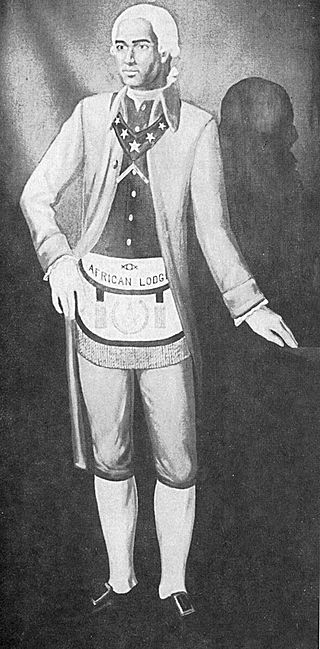
Prince Hall was an American abolitionist and leader in the free black community in Boston. He founded Prince Hall Freemasonry and lobbied for education rights for African American children. He was also active in the back-to-Africa movement.

Mather Byles was an American clergyman active in British North America.
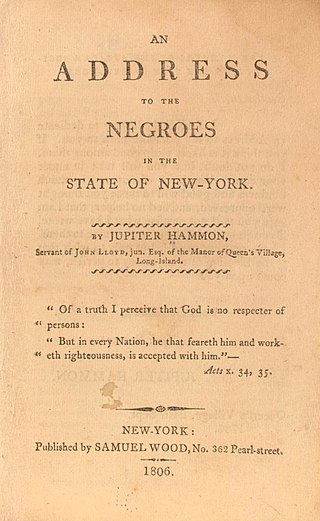
Jupiter Hammon was an American writer who is known as a founder of African-American literature, as his poem published in 1761 in New York was the first by an African American in North America. He subsequently published both poetry and prose. In addition, he was a preacher and a commercial clerk on Long Island, New York.
Nationality words link to articles with information on the nation's poetry or literature.

In the American Revolution, gaining freedom was the strongest motive for Black enslaved people who joined the Patriot or British armies. It is estimated that 20,000 African Americans joined the British cause, which promised freedom to enslaved people, as Black Loyalists. Around 9,000 African Americans became Black Patriots.

Black Patriots were African Americans who sided with the colonists who opposed British rule during the American Revolution. The term "Black Patriots" includes, but is not limited to, the 5,000 or more African Americans who served in the Continental Army and Patriot militias during the American Revolutionary War.
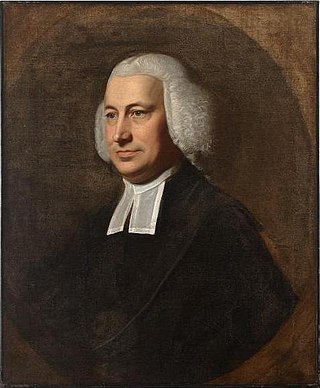
Samuel Cooper was a Congregational minister in Boston, Massachusetts, affiliated with the Brattle Street Church. He was born in Boston to William Cooper and Judith Sewall, attended the Boston Latin School, and was graduated from Harvard College in 1743. He was ordained as a minister on May 21, 1746, and served as pastor of the Brattle Street Church, 1747-1783. Members of his parish at the Brattle St. Church included some of the most influential people of the American Revolution: John Hancock, Samuel Adams, Joseph Warren, John Adams, and others. He corresponded with Benjamin Franklin, Charles Hector d'Estaing, Gideon Hawley, Charles Gravier de Vergennes; and was associated with Phillis Wheatley. In 1780, he co-founded the American Academy of Arts and Sciences. He served as "chaplain to the General Court" 1758-1770 and 1777-1783. Around 1783 Harvard College offered Cooper the position of college president, but Cooper declined. In September 1746 he married Judith Bulfinch; they had two daughters. A portrait of Cooper by John Singleton Copley now resides in the collection of the Massachusetts Historical Society.

Poems on Various Subjects, Religious and Moral by Phillis Wheatley, Negro Servant to Mr. John Wheatley, of Boston, in New England is a collection of 39 poems written by Phillis Wheatley, the first professional African-American woman poet in America and the first African-American woman whose writings were published.
Primus Hall was born a slave. He is believed to be the son of Prince Hall, an abolitionist, Revolutionary War soldier and founder of the Prince Hall Freemasonry.
Until 1950, African Americans were a small but historically important minority in Boston, where the population was majority white. Since then, Boston's demographics have changed due to factors such as immigration, white flight, and gentrification. According to census information for 2010–2014, an estimated 180,657 people in Boston are Black/African American, either alone or in combination with another race. Despite being in the minority, and despite having faced housing, educational, and other discrimination, African Americans in Boston have made significant contributions in the arts, politics, and business since colonial times.

Katharine Greene Amory was an 18th-century Bostonian known for the journal she kept during the American Revolution. It is valued by historians for its record of daily life and for its window onto the viewpoint of a Loyalist woman.
The Dying Negro: A Poetical Epistle was a 1773 abolitionist poem published in England, by John Bicknell and Thomas Day. It has been called "the first significant piece of verse propaganda directed explicitly against the English slave systems". It was quoted in The Interesting Narrative of the Life of Olaudah Equiano of 1789.

Portrait of Phillis Wheatley is a lost painting used as the frontispiece for poet Phillis Wheatley's poetry collection Poems on Various Subjects, Religious and Moral, first published in 1773. Wheatley was the United States' first professional African American woman poet and the first African-American woman whose writings were published. She is also the third woman in the United States, regardless of ethnicity, to have her written work published. Copies of the engraving reside in the National Portrait Gallery at the Smithsonian Institution, the Library of Congress, the Beinecke Rare Book & Manuscript Library of the Yale University Library, and the Metropolitan Museum of Art.

Prince Demah was an American painter of African ancestry who was formerly enslaved and active in Boston in the late 1700s. According to The Metropolitan Museum of Art, Demah is "the only known enslaved artist working in colonial America whose paintings have survived."
Sarah Parsons Moorhead was an American poet, artist, and polemicist active during the Great Awakening in the 18th century. Her poems critique the itinerant ministers of the Great Awakening and demonstrate the emergence of women's voices during that time.
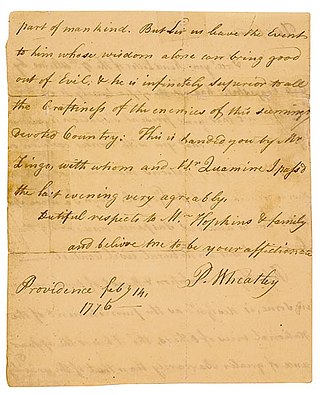
Obour Tanner, also spelled Abour or Arbour, was an enslaved African woman who lived in Newport, Rhode Island. Tanner was a regular correspondent of poet Phillis Wheatley, and the only correspondent of Wheatley's that was of African descent. Tanner acted as an agent for Wheatley in Newport and made the largest known order of Wheatley's Poems on Various Subjects, Religious and Moral in 1773.












